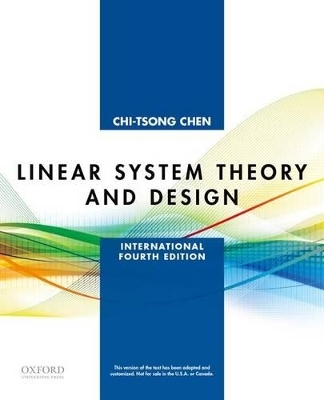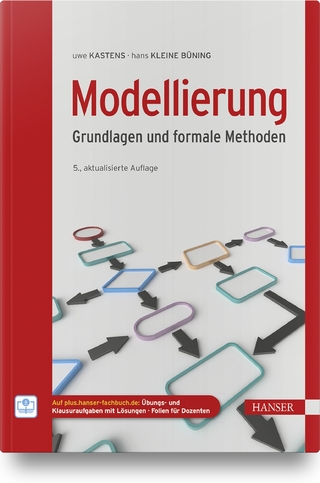
Linear System Theory and Design
Oxford University Press Inc (Verlag)
978-0-19-996454-3 (ISBN)
Chi-Tsong Chen is Professor Emeritus of Electrial and Computer Engineering at Stony Brook University, New York
1 Introduction ; 1.1 Introduction ; 1.2 Overview ; 1.2.1 A brief history ; 2 Mathematical Descriptions of Systems ; 2.1 Introduction ; 2.2 Causality, lumpedness, and time-invariance ; 2.2.1 Impulses ; 2.3 Linear time-invariant (LTI) systems ; 2.3.1 Multi-input multi-output case ; 2.4 Linear time-varying systems ; 2.3.1 Linearization ; 2.5 RLC circuits { Comparisons of various descriptions ; 2.6 Mechanical and hydraulic systems ; 2.7 Proper rational transfer functions ; 2.8 Discrete-time linear time-invariant systems ; 2.9 Concluding remarks ; Problems ; 3 Linear Algebra ; 3.1 Introduction ; 3.2 Basis, representation, and orthonormalization ; 3.3 Linear algebraic equations ; 3.4 Similarity transformation ; 3.5 Diagonal form and Jordan form ; 3.6 Functions of a square matrix ; 3.7 Lyapunov equation ; 3.8 Some useful formula ; 3.9 Quadratic form and positive de niteness ; 3.10 Singular value decomposition ; 3.11 Norms of matrices ; Problems ; 4 State-Space Solutions and Realizations ; 4.1 Introduction ; 4.2 General solution of CT LTI state-space equations ; 4.2.1 Discretization ; 4.2.2 General solution of DT LTI state-space equations ; 4.3 Computer computation of CT state-space equations ; 4.3.1 Real-time processing ; 4.3.2 Op-amp circuit implementation ; 4.4 Equivalent state equations ; 4.4.1 Canonical forms ; 4.3.2 Magnitude scaling in op-amp circuits ; 4.5 Realizations ; 4.5.1 Multi-input multi-output case ; 4.6 Solution of linear time-varying (LTV) equations ; 4.6.1 Discrete-time case ; 4.7 Equivalent time-varying equations ; 4.8 Time-varying realizations ; Problems ; 5 Stability ; 5.1 Introduction ; 5.2 Input-output stability of LTI systems ; 5.3 Discrete-time case ; 5.4 Internal stability ; 5.4.1 Discrete-time case ; 5.5 Lyapunov theorem ; 5.5.1 Discrete-time case ; 5.6 Stability of LTV systems ; Problems ; 6 Controllability and Observability ; 6.1 Introduction . ; 6.2 Controllability ; 6.2.1 Controllability indices ; 6.3 Observability ; 6.3.1 Observability indices ; 6.4 Canonical decomposition ; 6.5 Conditions in Jordan-form equations ; 6.6 Discrete-time state-space equations . ; 6.6.1 Controllability to the origin and reachability ; 6.7 Controllability after sampling ; 6.8 LTV state-space equations ; Problems ; 7 Minimal Realizations and Coprime Fractions ; 7.1 Introduction ; 7.2 Implications of coprimeness ; 7.2.1 Minimal realizations ; 7.2.2 Complete characterization ; 7.3 Computing coprime fractions ; 7.3.1 QR decomposition ; 7.4 Balanced realization ; 7.5 Realizations from Markov parameters ; 7.6 Degree of transfer matrices ; 7.7 Minimal realizations{Matrix case ; 7.8 Matrix polynomial fractions ; 7.8.1 Column and row reducedness ; 7.8.2 Computing matrix coprime fractions ; 7.9 Realization from matrix coprime fractions ; 7.10 Realizations from matrix Markov parameters ; 7.11 Concluding remarks ; Problems ; 8 State Feedback and State Estimators ; 8.1 Introduction ; 8.2 State feedback ; 8.2.1 Solving Lyapunov equation ; 8.3 Regulation and tracking ; 8.3.1 Robust tracking and disturbance rejection ; 8.3.2 Stabilization ; 8.4 State estimator ; 8.4.1 Reduced-dimensional state estimator ; 8.5 Feedback from estimated states . ; 8.6 State feedback{MIMO case ; 8.6.1 Cyclic design ; 8.6.2 Lyapunov-equation method ; 8.6.3 Canonical-form method ; 8.6.4 E ect on transfer matrices ; 8.7 State estimators{MIMO case ; 8.8 Feedback from estimated states{MIMO case ; Problems ; 9 Pole Placement and Model Matching ; 9.1 Introduction ; 9.2 Preliminary { Matching coe cients ; 9.2.1 Compensator equation{Classical method ; 9.3 Unity-feedback con guration{Pole placement ; 9.3.1 Regulation and tracking ; 9.3.2 Robust tracking and disturbance rejection ; 9.3.3 Embedding internal models ; 9.4 Implementable transfer functions ; 9.4.1 Model matching{Two-parameter con guration ; 9.4.2 Implementation of two-parameter compensators ; 9.5 MIMO unity feedback systems ; 9.5.1 Regulation and tracking ; 9.5.2 Robust tracking and disturbance rejection ; 9.6 MIMO model matching{Two-parameter con guration ; 9.6.1 Decoupling ; 9.7 Concluding remarks ; Problems ; References ; Answers to Selected Problems ; Index
| Erscheint lt. Verlag | 27.2.2014 |
|---|---|
| Reihe/Serie | The Oxford Series in Electrical and Computer Engineering |
| Zusatzinfo | b/w illus. |
| Verlagsort | New York |
| Sprache | englisch |
| Maße | 231 x 196 mm |
| Gewicht | 1 g |
| Themenwelt | Mathematik / Informatik ► Informatik ► Theorie / Studium |
| Technik ► Elektrotechnik / Energietechnik | |
| ISBN-10 | 0-19-996454-8 / 0199964548 |
| ISBN-13 | 978-0-19-996454-3 / 9780199964543 |
| Zustand | Neuware |
| Haben Sie eine Frage zum Produkt? |
aus dem Bereich


